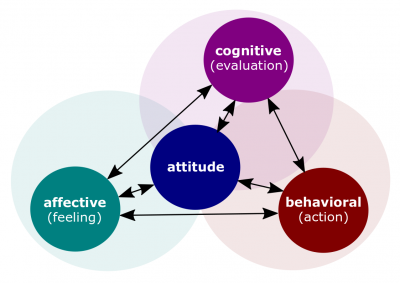Difference between revisions of "Attitude"
MariamKhalid (talk | contribs) |
|||
| Line 1: | Line 1: | ||
[[File:Attitude.png|400px|thumb|right|[[Attitude]]]][[Attitude]] is an evaluative statement or judgment, either favorable or unfavorable, concerning objects, people, or events. | [[File:Attitude.png|400px|thumb|right|[[Attitude]]]][[Attitude]] is an evaluative statement or judgment, either favorable or unfavorable, concerning objects, people, or events. | ||
| + | |||
==Definitions== | ==Definitions== | ||
| Line 8: | Line 9: | ||
According to [[Marketing Management by Keller and Kotler (15th edition)]], | According to [[Marketing Management by Keller and Kotler (15th edition)]], | ||
:[[Attitude]]. A person's enduring favorable or unfavorable evaluation, emotional feeling, and action tendencies toward some object or idea. | :[[Attitude]]. A person's enduring favorable or unfavorable evaluation, emotional feeling, and action tendencies toward some object or idea. | ||
| − | |||
==Components== | ==Components== | ||
| Line 14: | Line 14: | ||
*[[Affective component]]. The emotional or feeling segment of an [[attitude]]. | *[[Affective component]]. The emotional or feeling segment of an [[attitude]]. | ||
*[[Behavioral component]]. The segment of an [[attitude]] that refers to an intention to behave in a certain way toward someone or something. | *[[Behavioral component]]. The segment of an [[attitude]] that refers to an intention to behave in a certain way toward someone or something. | ||
| + | |||
| + | ==Cultural attitude== | ||
| + | :''Main wikipage: [[Cultural attitute]]'' | ||
==Related lectures== | ==Related lectures== | ||
Revision as of 02:51, 24 June 2020
Attitude is an evaluative statement or judgment, either favorable or unfavorable, concerning objects, people, or events.
Definitions
According to Organizational Behavior by Robbins and Judge (17th edition),
- Attitude. An evaluative statement or judgment concerning objects, people, or events.
According to Management by Robbins and Coulter (14th edition),
- Attitude. An evaluative statement, either favorable or unfavorable, concerning objects, people, or events.
According to Marketing Management by Keller and Kotler (15th edition),
- Attitude. A person's enduring favorable or unfavorable evaluation, emotional feeling, and action tendencies toward some object or idea.
Components
- Cognitive component. That part of an attitude that's made up of the beliefs, opinions, knowledge, or information held by a person. In other words, the cognitive component is the opinion or belief segment of an attitude.
- Affective component. The emotional or feeling segment of an attitude.
- Behavioral component. The segment of an attitude that refers to an intention to behave in a certain way toward someone or something.
Cultural attitude
- Main wikipage: Cultural attitute
